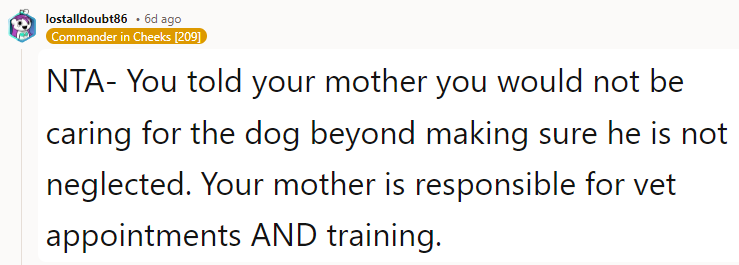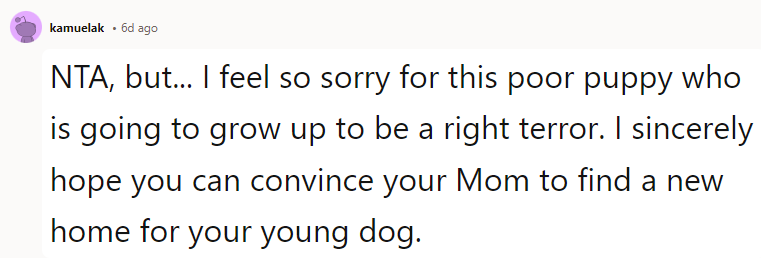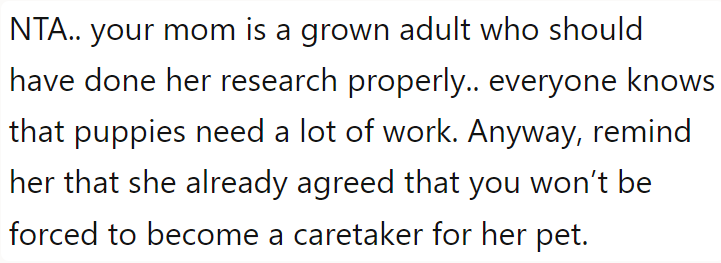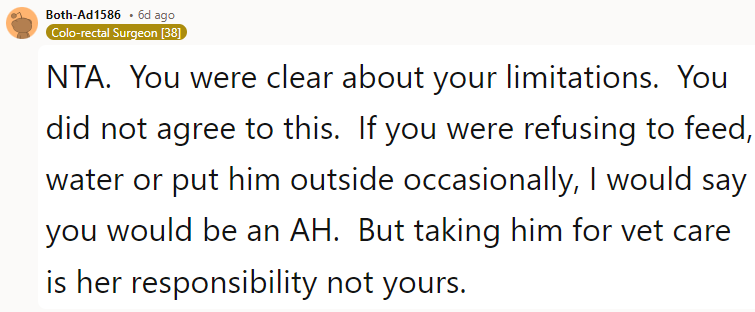"I Never Wanted That Dog" - Should I Put My Plans Aside to Help Mom with an Untrained Puppy
In a quiet suburban neighborhood, a 22-year-old non-binary individual lives with their mother in a cozy house accompanied by two dogs and a cat. The household is a blend of diverse personalities and unique challenges, primarily centered around their beloved pets.
One of the dogs, an elderly canine with significant hip issues, demands careful and considerate care due to her mobility limitations. The other dog, a young, energetic puppy, has brought a whirlwind of activity and chaos into their lives.
The mother, who also faces her own mobility challenges, has struggled to manage the needs of the new puppy. When the idea of bringing a new puppy into the home was first discussed, the 22-year-old expressed strong reservations.
They were already juggling their own life challenges and the responsibilities of caring for the older dog. Adding the care of a young, untrained puppy to their already full plate seemed overwhelming.
Despite their clear opposition, the mother went ahead and brought the puppy into the household, assuming that her child would inevitably help with its care. Now, a year later, the household dynamics have become strained.
The young puppy remains untrained, frequently causing disturbances and requiring constant attention. Recently, the puppy developed a rash, prompting the mother to ask her child to take the dog to the vet.
Faced with this request, the 22-year-old is grappling with a moral dilemma: should they prioritize their own plans and well-being, or acquiesce to their mother's request despite the previous agreement?
The Story

She also has a lot of hip issues, as is common with her breed.

The Debate on Caregiving and Responsibility
Dr. Angela Myers, a family psychologist at UCLA, explains that caregiving often elicits strong emotional responses, particularly when responsibilities are unexpectedly assigned.
The debate around caring for an untrained puppy can reflect deeper issues about obligation, desire, and personal boundaries.
Research shows that when individuals feel coerced into caregiving roles, it can lead to resentment and burnout, particularly if they lack a genuine desire to participate.
She's Been Having These Issues for a While

I Struggle to Care for Myself

From a psychological perspective, the notion of obligation versus personal desire can create significant internal conflict.
Studies published in the Journal of Family Psychology indicate that when individuals feel their autonomy is compromised, it can lead to stress and dissatisfaction.
Encouraging open conversations about responsibilities and personal boundaries can alleviate some of this tension.
My Mom Insisted

I Was Incredibly Annoyed

The Impact of Guilt in Caregiving Decisions
Guilt often plays a significant role in decisions about caregiving, particularly when family expectations are involved.
Research suggests that guilt can be a powerful motivator, but it can also lead to resentment if individuals feel forced into roles they don’t want.
Understanding the emotional impact of these decisions is crucial for maintaining healthy family dynamics.
He Still Destroys Things

WIBTA If I Said No?

The story unfolds with the 22-year-old feeling burdened by the additional responsibilities of the new puppy. Despite their initial refusal to be involved in the puppy’s care, their mother continues to rely on them for help.
The older dog’s health remains a concern, exacerbated by the puppy’s rough behavior. The mother’s latest request to take the puppy to the vet for a rash has brought the tension to a head.
The individual wonders if they would be wrong to refuse, given the strain it would add to their day. Now, let’s see what others have to say about this situation.
Would I Be the Asshole If I Said No?

NTA - You Told Your Mother You Would Not Be Caring for the Dog Beyond Making Sure He Is Not Neglected

Practical strategies for navigating these situations include setting clear boundaries about what one is willing to take on.
Having honest discussions with family members about personal limits can prevent future conflicts and promote understanding.
Moreover, exploring the option of shared caregiving responsibilities can alleviate the burden on any single individual.
NTA, But... I Feel So Sorry for This Poor Puppy Who Is Going to Grow Up to Be a Right Terror.

NTA... Your Mom Is a Grown Adult Who Should Have Done Her Research Properly

What do you think about this predicament? If you were in their shoes, would you prioritize your own plans or help with the puppy despite the previous agreement?
Share your thoughts and let us know what actions you would take in this situation.
NTA. You Were Clear About Your Limitations.

Psychological Analysis
This situation illustrates the emotional complexities involved in family caregiving and the importance of personal autonomy.
It's essential to find a balance between familial obligations and personal desires to maintain healthy relationships.
Analysis generated by AI
Analysis & Alternative Approaches
In conclusion, navigating family responsibilities can be complex, especially when personal desires conflict with expectations.
Research indicates that open communication and boundary-setting are key to maintaining healthy relationships in caregiving scenarios.
By fostering a culture of respect for individual choices, families can create more harmonious dynamics.




